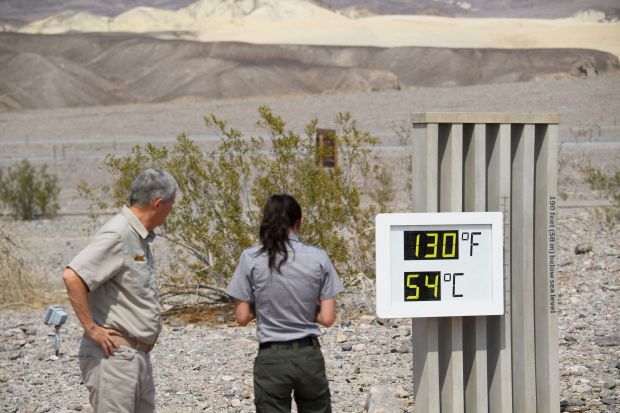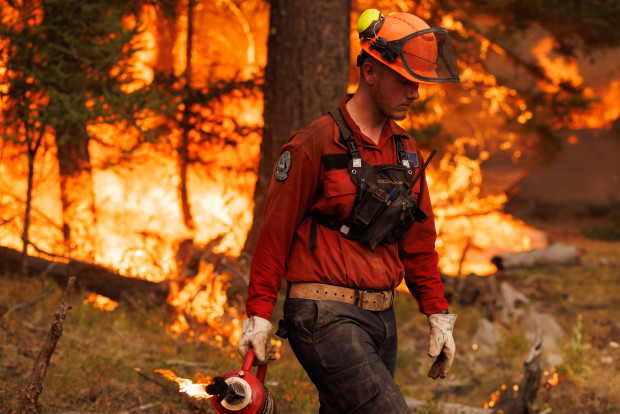
Four days before July came to a close, UN Secretary-General António Guterres said that unless the planet underwent some kind of miraculous “mini-Ice Age” in a matter of days, the month would be the hottest in history. His prediction was right. “Climate change is here,” he said, gravely. “And [this] is just the beginning.”
Record heat waves are part and parcel of extreme weather patterns caused by climate change, and it has a domino effect on weather patterns that follow. People all across the globe are feeling the heat -- in dangerous and harmful ways. Guterres wasn’t being overdramatic when he warned that “the era of global warming has ended” and “the era of global boiling has arrived.”
Europe's Wildfires Disrupt Agriculture, Tourism, and More
As July rolled into August, firefighters across Greece were finally able to gain the upper hand in battling wildfires raging across nearly 900 square miles of island and inland territory. The growing intensity of summer heatwaves has heightened drought conditions, sparking fires that drove tourists and residents to seek refuge.
Despite fears of a looming recession and economic impacts from Russia's war in Ukraine, the European tourism markets were slated to keep growing through the summer of 2023. For countries like Greece, where tourism accounts for 17% of the country's Gross National Product (GNP), even just these losses in revenue due to fires would be difficult.
On top of that, however, drought-ridden regions of the EU are also suffering losses in agriculture and livestock production. Agriculture accounts for 4.4% of Greece's GDP in the growth of wheat, barley, corn, olives, grapes, and more. The country is also the only grower of cotton in the EU.
Meanwhile, Spain and Italy, whose economies are only a slightly smaller bit reliant on the production of staples like grains, livestock, fruit, and dairy, have also experienced significant losses due to heat waves.
Crop yields have also been harmed by drought in neighboring Turkey, Bulgaria, Romania, and more. Cumulative losses are also driving up the cost of food and goods across Europe.

Canadian Wildfires Rage On
Since late April, wildfires have been pushing their way across large swaths of Canada's drought-ridden, densely forested regions. These fires have destroyed an overwhelming 20 million acres, and have proved more difficult to manage than controlled burns of the past.
Fires in Canada have reduced timber harvests, put a stop to oil and gas operations, and put a serious strain on tourism for the year. And like many other countries dealing with heat waves, record numbers of people are overwhelming healthcare systems with heat-related illnesses.
Canadian wildfires have also pushed dust and smoke into the air as far south as the United States. In early June, New York City officials released an air quality warning, telling residents to remain inside whenever possible as the sky turned a dark, smoky hue of orange. The city essentially shut down for multiple days, resulting in business closures.
Heat Dome Bakes the Southwestern U.S.
Heat domes are another phenomenon caused by excess heat, and there are several sitting over parts of the northern hemisphere. A dome occurs when the atmosphere traps a patch of oceanic hot air in one region, causing it to cycle, making it difficult for cool fronts to penetrate and provide relief. One such pocket rests over the southwestern portion of the United States right now.
In Nevada and Texas, day laborers are being told not to work and businesses are being shut down during the hottest portions of the day. In Arizona, hospitalization numbers have returned to pandemic levels due to heat-related injuries and illnesses. Residents in Texas, which runs on its own independent electrical grid, are also using record-breaking amounts of energy.
Tourist destinations in these and other areas have taken a hit in revenue as well. Not only is it too hot for outdoor activities in several states, but some regions have seen other incidences of severe weather.
Another wave of floods through Yellowstone National Park will likely discourage visitors in the upcoming seasons, though the park is now open and repairing the damage. Meanwhile, parts of Arizona and New Mexico have been battling their own wildfires, and severe storms have caused massive power outages throughout the Midwest and Ohio River Valley.
When it comes to real estate, extreme heat caused by climate change is also making some multi-million dollar homes uninsurable. Insurance companies are pulling out of areas like the California coastlines prone to wildfire or Florida coastlines vulnerable to hurricane damage.
Monsoon Season Sends Floods Through Japan, China, India, and More
Many countries in the northern hemisphere are battling heat domes, but Asia is also grappling with another facet of extreme weather -- flooding. This monsoon season has dropped record amounts of rainfall onto India, China, Japan, and South Korea. Reports of flash floods, power outages, and landslides have destroyed homes and businesses, displaced residents, and increased risk of disease and other health concerns.
Many countries are seeing significant strains on power grids -- parts of China have reportedly experienced rolling electrical blackouts as low rainfall has put a strain on the country's lucrative hydroelectric power capabilities. The heat has also taken a toll on the country's crop growth and livestock.
In India, disruptions in agriculture and labor have put a dent in the country's plans to grow its economy after the pandemic. The World Bank predicts that its national GDP could drop by 6.3% over the year due to severe weather -- and stands to fall even more the longer the heat persists.
Japan has asked its citizens to ration air conditioning and electricity. In March, an earthquake forced nuclear power plants to shut down, putting additional strain on resources and infrastructure. Record heat and increased demand for electricity has put the country in a bind.
South American Countries Suffer Record Drought
Chile, Argentina, and Uruguay are at the center of a heat pocket causing drought and forest fires across South America. Falling agricultural and lumber exports are estimated to cost Argentina up to $15 billion. In Uruguay, the ranching and farming industries are facing $1.1 billion in lost revenue. Both governments are providing farmers and other residents financial aid.
The Middle East and Africa
Some of the globe’s most heavily affected areas fall right in the center of the map -- the Middle East and Africa. In Kuwait, Iraq, Bahrain, Saudi Arabia, and more, streets are all but deserted in daytime hours, and laborers are few and far between. Decreased production promises to have future effects on a part of the world where the heat index is pushing the limits of human survival.
For years now, local fishing and tourism economies along the coasts of Africa have been feeling the effects of the heat, too. Rising sea levels, warming waters, and increasing ocean acidification have caused mounting damage to the fishing and tourism markets, and have only been exacerbated by this year's record temperatures.
Last year, the U.N.’s World Meteorological Organization estimated that the last 50 years of drought, brought on by global warming, had cost the continent an estimated $70 billion dollars -- and counting.
Calculating Long-Term Economic Damage From Extreme Heat
It's difficult to calculate the full economic impacts of this summer's record heat waves because global warming, scientists say, has a cascading effect. That means that hot conditions across the planet make it prime for even hotter conditions in the future. One weather pattern can cause a domino effect, leading to more catastrophes down the road.
Some effects, like the increase in flight turbulence, are details that companies have been unable to foresee -- trapped heat in the atmosphere creates air pockets, making airline flights in general, more likely to be bumpy. Other effects, though, are easier to predict.

One major silent factor of the radiating heat is affecting everyone -- heat stress. It's likely to make the average worker less productive, and in many instances cause injury or illness. This loss in productivity could cost the U.S. about $100 billion annually, according to one report.
Government spending on evacuation efforts is also a major factor when it comes to calculating the costs of this major weather event. While costs vary from country to country and event to event, in the U.S. weather disaster relief efforts can cost billions of dollars. Medical facilities in affected areas are burdened with costs of evacuation or overloaded with patients, which can eat up millions of dollars.
There are social costs to these heat waves, too. In India, a recent study showed that heatwaves are putting “unprecedented burdens” on the country’s economic health, which in turn is “undermining the country's long-term efforts to reduce poverty, inequality, and illness.” It's simple -- when government funds go toward recovering from the damaging effects of extreme weather, other government programs lose out.
The Cost of Innovation
Climate change, and the resulting record-breaking heatwaves across the world, may be the most complicated problem humanity has to solve -- at least Bill Gates thinks so. But unfortunately, some of the countries most impacted by extreme heat struggle to afford the technological innovations required to protect them from harmful impacts.
Last year, a Guardian report found that “African countries, which are the least responsible for the global climate crisis, face seeing their GDP growth rate fall by up to 64% by the end of the century, according to research – even if the world succeeds in limiting global heating to 1.5C.”
And as the heat increases, our reliance on fossil fuels for short-term relief increases. As seen in China or parts of South America, record low rainfall has increased the demand for a fuel source that is ultimately making the problem worse, not better.
Author and climate activist Bill McKibben has likened fighting climate change to a "world war" and warns the ultimate economic impact will be astronomical.
When someone moans about $3.5 trillion spending over 10 years, perhaps remind them that the estimates for the cost of unchecked climate change top out at $551 trillion, which is more money than there is on earth at the moment.
— Bill McKibben (@billmckibben) October 3, 2021







